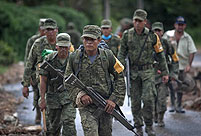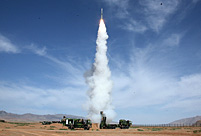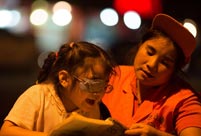KUNMING, Sept. 21 -- Chinese Vice President Li Yuanchao on Saturday delivered a speech at the opening ceremony of the Commemoration of the International Day of Peace 2013 & China-South Asia Peace and Development Forum held in Kunming, capital of southwest China's Yunnan Province.
The following is the full text of Li's speech:
Build Lasting Peace in South Asia Through Cooperation and Development
Address at the Opening Ceremony of the Commemoration of the International Day of Peace 2013 & China-South Asia Peace and Development Forum
Li Yuanchao
Kunming, Yunnan, September 21, 2013
Today, the Commemoration of the International Day of Peace 2013 and China-South Asia Peace and Development Forum is held in the beautiful province of Yunnan, offering a platform for dialogues and discussions on cooperation and development of China and South Asian countries. This is a response to the calls of our times, and to the aspiration of our people.
Lying between the Himalayan Mountains and the Indian Ocean, South Asia is a vast region covering nearly 5 million square kilometers with a total population of over 1.6 billion. The people here, who have suffered for a long time from wars and chaos, share a common desire for lasting peace.
The destinies of the South Asian people are bound together by similar histories. As the cradle of one of the four great ancient civilizations, South Asia used to be the most prosperous part of the world. Since modern times, however, invasions by Western colonizers have brought enormous sufferings to the region. The people of South Asia fought tenaciously for independence and liberation, and finally embarked on a path of development of their own. In this process, the people of the region have forged a community of shared destiny.
War is the biggest stumbling block to development in South Asia. In the colonial period, the colonizers, with their "divide and rule" strategy, sowed the seeds of conflicts in the region. Over the decades, countries in South Asia have lost many development opportunities to territorial disputes, sectarian strife, and ethnical conflicts. Three decades of war in Afghanistan have made over 11 million people refugees, and the civil war of Sri Lanka displaced more than 700,000 people. From the 1960s to the 1980s, South Asia's economy grew by only about 4 percent annually, while the "Four Asian Tigers" were rocketing at 10 percent. At present, there are still 600 million South Asian people living in poverty. According to a development report by the World Bank, political and security situation is a major factor impeding economic growth in South Asia. History tells us, to pursue economic growth and better livelihood, we must first and foremost secure peace and stability.

 Storms leave 97 dead, 58 missing in Mexico
Storms leave 97 dead, 58 missing in Mexico New model of indigenous surface-to-air missiles testfired
New model of indigenous surface-to-air missiles testfired  118.28-carat diamond to be auctioned in HK
118.28-carat diamond to be auctioned in HK Maternal love under streetlight
Maternal love under streetlight Naked foreign student sits in the middle of a road in Haikou
Naked foreign student sits in the middle of a road in Haikou  Colorful Yunnan: Enjoy the natural beauty
Colorful Yunnan: Enjoy the natural beauty Harbin named Chinese city with most beautiful women
Harbin named Chinese city with most beautiful women New college students' military training in Guangzhou
New college students' military training in Guangzhou Rugby girls
Rugby girls PLA's 38th Group Army conduct training
PLA's 38th Group Army conduct training Residences of the royal house of Savoy
Residences of the royal house of Savoy The last days of Wan Aihua
The last days of Wan Aihua Highlights at 12th National Games of China
Highlights at 12th National Games of China Beijing Film Academy welcomes freshmen
Beijing Film Academy welcomes freshmen Large mahjong party sets new world record
Large mahjong party sets new world recordDay|Week|Month